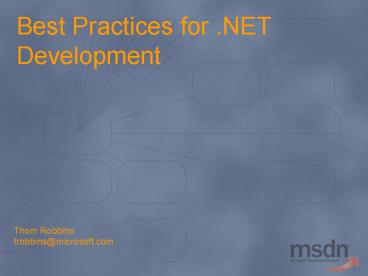Best Practices for .NET Development - PowerPoint PPT Presentation
Title:
Best Practices for .NET Development
Description:
Derive new custom exceptions from the ApplicationException class. Agenda .NET Design Guidelines ... Role-Based Security. Imperative (new way) public void DoTransaction ... – PowerPoint PPT presentation
Number of Views:74
Avg rating:3.0/5.0
Title: Best Practices for .NET Development
1
Best Practices for .NET Development
Thom Robbinstrobbins_at_microsoft.com
2
What we will cover
- Design Guidelines
- Memory Management
- Data Access
- Internet Services
- Threading
- Security
3
Session Prerequisites
- Know VB .NET or C
- Be familiar with .NET Base Class Libraries
- Be familiar with XML
Level 300
4
So Why This Presentation?
- You know you are a VB programmer if
- You ever had to use the On Error Goto statement
- You never wrote a multi-threaded app
- You know you are a C programmer if
- You ever had to check an HRESULT every 2 lines of
code - 30 of your code was releasing objects from
memory - You know you are an ADO programmer if
- You had to convert between a Recordset and a DOM
and transform the XML 5 times in between
5
Agenda
- .NET Design Guidelines
- Memory Management
- Data Access
- Internet Services
- Threading
- Security
6
.NET Design GuidelinesNaming Conventions
- Hungarian notation is out!
- For public interfaces, use PascalCasing
- For private members, use camelCasing
- Use underscore _ character to denote private
class members - Use camelCasing for all method parameters
7
.NET Design GuidelinesNaming Conventions
public class Customer private string
_password public void SetPassword(string
newPassword) _password
newPassword
8
.NET Design GuidelinesClass Members Usage
- Dont use public fields, use properties
- No write-only methods, use a method
- Only use properties for setting and retrieving
values - Allow properties to be set in any order
- Use a consistent ordering and naming pattern for
parameters
9
.NET Design GuidelinesBase Classes vs. Interfaces
- Only Use Interfaces When
- Unrelated classes want to support a protocol
- Aggregation is not appropriate
- Provide class customization through protected
methods
10
.NET Design GuidelinesError Raising and Handling
- Exceptions are not for flow of control!
- Exceptions are exceptional
- Derive new custom exceptions from the
ApplicationException class
11
Agenda
- .NET Design Guidelines
- Memory Management
- Data Access
- Internet Services
- Threading
- Security
12
Memory Management
- Avoid Finalize()
- Only use Finalize() with Dispose()
public void Dispose() // Clean up unmanaged
resources GC.SuppressFinalize(this) protec
ted override void Finalize() // Clean up
unmanaged resources base.Finalize()
13
Agenda
- .NET Design Guidelines
- Memory Management
- Data Access
- Internet Services
- Threading
- Security
14
Data AccessAccessing Relational Data
- Always use the optimal Managed Provider
- Pick DataReader over DataSet when possible
- Used stored procedures when possible
- Do NOT use dynamic connection strings
15
Data AccessXML Data
- Use the XmlDataDocument for XML/DataSet
integration - DOM ? DataSet ? DOM
- Dont use DOM if you dont need it
- Only necessary for in-memory editing
- XmlReader is faster than DOM
16
Agenda
- .NET Design Guidelines
- Memory Management
- Data Access
- Internet Services
- Threading
- Security
17
Internet ServicesWebClient vs. WebRequest
- Use WebClient for simple request and response
operations - Use WebRequest for more complex operations
- Asynchronous requests, setting headers, etc.
18
Internet ServicesGeneral Tips
- Dont pass credentials every time
- Dont type cast to descendant classes, such as
HttpRequest - In ASP.NET, use the asynchronous methods of
GetResponse and GetResponseStream - As a good starting point, use 8
connections/processor
19
Agenda
- .NET Design Guidelines
- Memory Management
- Data Access
- Internet Services
- Threading
- Security
20
ThreadingGeneral Tips
- Avoid locks whenever possible
- Dont provide static methods that alter static
state - Asynchronous invocation via delegates are the
preferred threading mechanism
21
ThreadingSynchronization
- Starvation is caused by multiple threads
contending for a resource - The Monitor and ReaderWriterLock are designed to
prevent starvation
22
Agenda
- .NET Design Guidelines
- Memory Management
- Data Access
- Internet Services
- Threading
- Security
23
SecurityKey Concepts
- Use the principal of least privilege
- Dont run Visual Studio with admin privileges
- Use the runas utility
- C\gtrunas /usertimmc\administrator cmd
- Enter password for timmc\administrator
- Lock down security policy early
24
SecurityCode Access Security
- Access to a protected resource
- The ability to perform a protected operation
FileIOPermission permission new
FileIOPermission(PermissionState.None) permission
.AllLocalFiles FileIOPermissionAccess.Read
25
SecurityRole-Based Security
- Imperative (old way)
public void DoTransaction() IPrincipal
principal Thread.CurrentPrincipal if
(!principal.IsInRole("Managers"))
throw new SecurityException("Not a "
"manager!") //
OK, do the transaction...
26
SecurityRole-Based Security
- Imperative (new way)
public void DoTransaction()
PrincipalPermission permission new
PrincipalPermission(null, "Managers")
permission.Demand() // Now do the
transaction...
27
SecurityRole-Based Security
- Declarative
PrincipalPermission(SecurityAction.Demand,
Role"Managers") void
DoTransaction() // this time, really //
do the transaction...
28
Session Summary
- Write consistent and predictable code
- Write scalable, high-performance code
- Write secure code
29
For More Information
- MSDN Web site at
- msdn.microsoft.com
- MSDN Magazine
- http//msdn.microsoft.com/msdnmag/
30
For More Information
- Microsoft Visual Studio .NET Documentation
- http//msdn.microsoft.com/library/default.asp?url
/nhp/Default.asp?contentid28000451
31
MS PressEssential Resources for Developers
To find the latest developer related titles
visit www.microsoft.com/mspress
32
(No Transcript)































